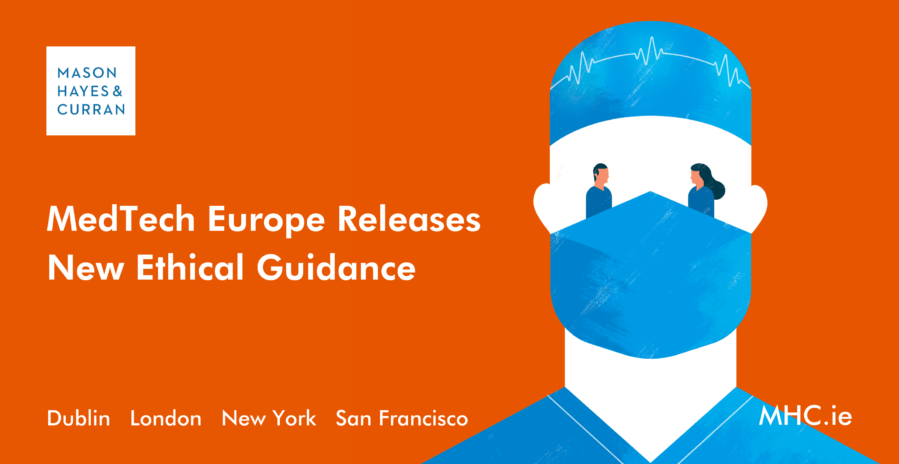MedTech Europe Releases New Ethical Guidance

The MedTech Europe Code of Ethical Business Practice (the Code) seeks to regulate the relationship between the medical device industry, healthcare professionals and healthcare organisations in a manner that encourages increased trust and patient safety. We examine the updates to the Code coming into force on 1 January 2023.
The MedTech Code is an evolving package of guidelines which aims to highlight up to date best practices to its members. In this most recent update, it has been expanded to include guidance on collaborative research, a section dealing with the calculation of in-kind educational grants and a new chapter on the use of third-party intermediaries. While the Code is only strictly applicable to MedTech Europe members, its terms offer helpful guidance relevant to the entire medical devices industry.
Collaborative Research
New guidance on collaborative research widens the research options open to members, having been previously limited to member-initiated research, post market product evaluation and third-party research grants. Under this new heading, scientific research is allowed to be conducted by members in collaboration with non-industry partners provided that research has a “legitimate purpose”.
Given that research and development is considered one of the most cost intensive aspects of medical device manufacturing, and that securing a steady flow of financing is a significant challenge when bringing medical devices to the market, this new guidance acknowledges third party funders as an important part of the solution.
To qualify as collaborative research within the meaning of the updated Code, the third-party collaborator “must actively contribute significant skills, experience and/or resource complementary to the collaboration”. The areas of collaboration must also be defined in a written agreement. This feature differentiates it from the pre-existing research categories which allowed funding via research grants. In essence, MedTech has opened the door for its members to access non-industry funding and provides guidance on how to do so effectively and ethically.
Calculation of in-kind educational grants
The Code permits member companies to contribute to Third Party Organised Educational Conferences on an ‘in-kind’ basis provided that such contributions comply with the Code’s requirements. It has now been updated to include a new Annex on the calculation of in-kind grants.
Importantly, the Code now clarifies that these grants must have the purpose of “advancement of genuine medical education”. Members are also advised that “In-Kind Support” should not include direct handling of conference registration, delegate accommodation or travel, and should be limited to assistance such as “modest secretarial and/or logistical support to assist with meeting arrangements”. These updates to the Code are intended to give additional guidance to members on how to calculate the value of these types of contribution.
Third party intermediaries
This new chapter in the Code recognises the ethical responsibilities of Member Companies in their use of third-party service providers particularly in the realm of sales, marketing or promotions. The new chapter gives helpful instruction on what to consider and how to ensure their third-party intermediaries operate in an ethical way. Member firms may be held responsible in the event that a third-party intermediary operates in an unethical way while promoting or marketing their product.
At the outset, companies are advised to conduct a thorough risk assessment of the proposed market prior to engaging a third-party intermediary. This will involve a legal and ethical review of the environment as it relates to medical devices. In briefing the third-party firm, a member company should formalise the scope of the activities envisaged by the contract, defining the precise scope of the third party’s engagement with health care practitioners or organisations.
To further mitigate risk, prior to engagement, a “robust due diligence” should be performed by the member company upon potential third-party intermediary companies. The Code indicates this will include understanding the specific activities which may be deployed on the member company’s behalf. Once engaged, the member company has obligations to perform risk-based routine monitoring, auditing or other assessments for compliance with local laws and industry and professional codes.
The member company should also request confirmation of compliance with these frameworks from the third-party intermediary. Where a third-party intermediary fails to comply with local laws or industry and professional codes, the member company is “encouraged to implement necessary and appropriate corrective measures”.
Conclusion
Given that the first edition of the Code was released in 2015, these updates are significant and reflect the importance of ethical guidance in the field of medical devices. The updates on collaborative funding, in-kind grants and third[1]party intermediaries provide useful reference points to member companies on best practice, benefit patients by providing greater clarity to stakeholders around the control of advertising and marketing practices while also supporting innovation by providing for greater flexibility for funding.
A link to the updated Code is accessible here.
For more information, please contact a member of our Life Sciences and Product Regulatory team.
The content of this article is provided for information purposes only and does not constitute legal or other advice.
Share this:




